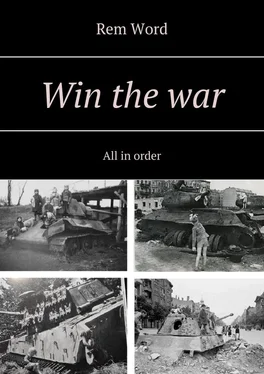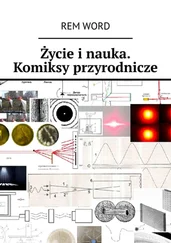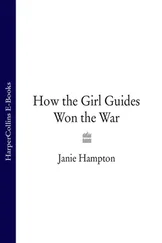Rem Wоrd - Win the war. All in order
Здесь есть возможность читать онлайн «Rem Wоrd - Win the war. All in order» — ознакомительный отрывок электронной книги совершенно бесплатно, а после прочтения отрывка купить полную версию. В некоторых случаях можно слушать аудио, скачать через торрент в формате fb2 и присутствует краткое содержание. ISBN: , Жанр: История, Справочники, Политика, Биографии и Мемуары, на английском языке. Описание произведения, (предисловие) а так же отзывы посетителей доступны на портале библиотеки ЛибКат.
- Название:Win the war. All in order
- Автор:
- Жанр:
- Год:неизвестен
- ISBN:9785449662637
- Рейтинг книги:5 / 5. Голосов: 1
-
Избранное:Добавить в избранное
- Отзывы:
-
Ваша оценка:
- 100
- 1
- 2
- 3
- 4
- 5
Win the war. All in order: краткое содержание, описание и аннотация
Предлагаем к чтению аннотацию, описание, краткое содержание или предисловие (зависит от того, что написал сам автор книги «Win the war. All in order»). Если вы не нашли необходимую информацию о книге — напишите в комментариях, мы постараемся отыскать её.
Win the war. All in order — читать онлайн ознакомительный отрывок
Ниже представлен текст книги, разбитый по страницам. Система сохранения места последней прочитанной страницы, позволяет с удобством читать онлайн бесплатно книгу «Win the war. All in order», без необходимости каждый раз заново искать на чём Вы остановились. Поставьте закладку, и сможете в любой момент перейти на страницу, на которой закончили чтение.
Интервал:
Закладка:
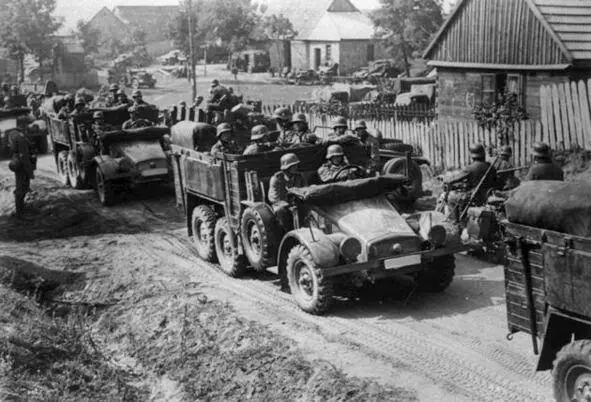
German troops in Poland, 1939. The thesis of the weak mechanization of Wehrmacht infantry units is being discussed in modern historical literature. However, as you can see, this is not quite true.
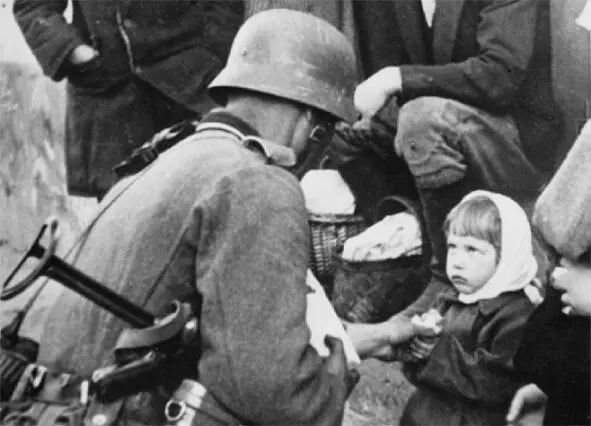
A significant part of ethnic Poles consider themselves to be an offshoot of the ancient Germanic tribe, or descendants of Iranian-speaking Sarmatians, but not Slavs. For some unknown reason, the unification of forces that has increased since 1938, 90 million Germany, and 35 million Poland, for their joint campaign to the East, will not take place. Otherwise, the USSR and its Anglo-Saxon allies could hardly count on winning in this war. Staged photography – a German soldier treats a wary Polish girl
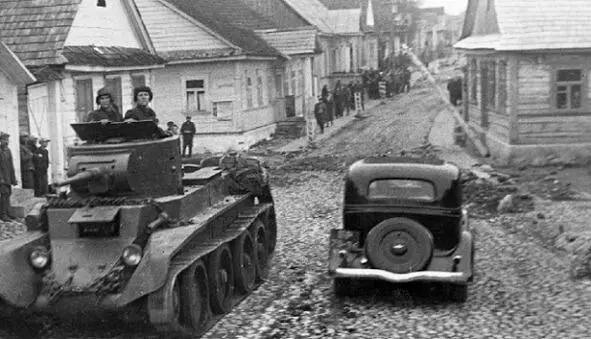
Since September 17, Soviet troops have entered Poland. Their goal is the return of Western Belorussia and Western Ukraine captured during the Russo-Polish War of 1920, the safety of the Belarusians, Ukrainians and Jews who are there. Main idea. If Poland shows courage in opposing Hitler, France and England are actively helping her, the Wehrmacht will meet a fitting rebuff, and the status quo is observed by the USSR. The obvious victory of the Germans, inclined, of course, to occupy the whole territory, means entry into the game of the Red Army. A part of Poland is Vilensky (Vilnius) region with 490 thousand inhabitants are transferred to Lithuania. Some territories are being transferred to another satellite of Germany – Slovakia. The 78,000 refugees (including Jews) who refused to accept Soviet citizenship from Poland occupied by Germany are deported back, or receive 20 years of camps. Loss of parties. Poland – irrevocably 63,000 soldiers and officers in battles with the Wehrmacht, 420,000 in German captivity Nearly 230,000 are captured by the USSR (privates and non-commissioned officers are dispersed home). In 1942, most of the Polish military, in agreement with England, bypassing Iran, joined the British forces, forming the army of generals Anders or Sikorsky). Polish air forces lose all their 360 aircraft of various types. Germany – 15,000 killed, as well as 320 armored vehicles and 285 aircraft (as a result of air crashes, air defense operations and fighters). Red Army – 2000 dead, 17 tanks and 10 aircraft. Irretrievable losses of the Poles in the battles with the Red Army – 3000. Slovak army: 18 people. The photograph shows the Soviet tank BT-7 in the Polish city of 1939.
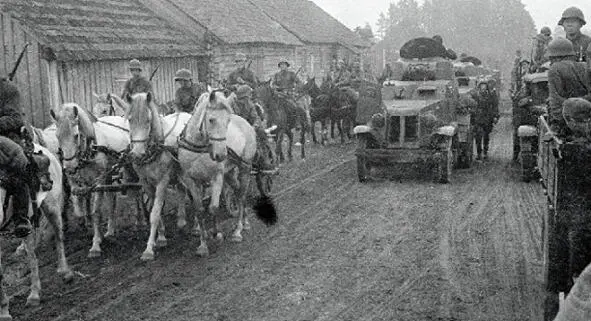
Soviet troops in Western Belarus. The republic reunites and gets rid of violent polonization. At the same time, according to Stalin’s decision, 100,000 wealthy (hard-working) peasants, entrepreneurs, and landowners are sent to the Gulag «for re-forging». The same statistics for Western Ukraine. In the center of the photo is the Soviet armored BA-10. Weight 5 tons, crew of 4 people, armor 10 mm., Gun 45 mm., Two machine guns. In subsequent battles with the Wehrmacht, this machine will manifest itself mediocre. Made 3 400 units. Repression (a beautiful word that does not convey the essence of the phenomenon) affects the commanding staff of the Red Army. When it comes to this, many historians and writers transfer the conversation to Mikhail Tukhachevsky. This Marshal (just like everyone else) makes some mistakes and «excesses» in the Civil War, military construction, and serves as a kind of example of the «correct action» of the punitive system. A senior officer is bad or good, arrest, torture, execution, have a negative effect on the army and the people. Of the five marshals of the Soviet Union in the dungeons of the NKVD killed three. Their fate is shared by 15 thousand other military leaders. Excessive mind is an aggravating circumstance. From the memoirs of General A. Gorbatov «Years and Wars»: «… Three sat at the table. At the chairman, who was sitting in the middle, I noticed a wide golden stripe on the sleeve of a black uniform. Captain Rank 1, I thought. The joyful mood did not leave me, for I only wanted to see the court in my case. The trial lasted four to five minutes. My last name, first name, middle name, year and place of birth were verified. Then the chairman asked: – Why did you not confess to the investigation of their crimes? – I did not commit crimes, because I had nothing to confess, I replied. «Why are ten people already confessed and convicted shown on you?» – asked the chairman. At that moment I was in such a good mood, and I was so sure that I would be released, that I dared to take liberty, and later I regretted it bitterly. I said: – I read the book «The Workers of the Sea» by Victor Hugo. It says: once in the sixteenth century, eleven people were caught in the British Isles, suspected of having links with the devil. Ten of them admitted their guilt, though not without the help of torture, and the eleventh did not confess. Then King Jacob II ordered the poor man to cook alive in a boiler: the fat, they say, would prove that this one also had a connection with the devil. Apparently, «I continued,» ten comrades who confessed and pointed at me experienced the same things as those ten Englishmen, but did not want to experience what was destined to the eleventh. The judges, grinning, exchanged glances among themselves. The chairman asked his colleagues, «How is everything clear?» Those nodded their heads. I was taken into the corridor. Two minutes passed. I was again brought into the hall and a sentence was announced: fifteen years in prison and a camp plus five years of defeat in rights…It was so unexpected that I, where I stood, there and sank to the floor. On the same day, they transferred me to Butyrka prison, to a cell where only convicts were waiting to be sent. Upon entering, I greeted loudly and introduced myself in a military way: "Kombrig Gorbatov." After Lefortovo, this prison seemed to me to be a sanatorium. True, in a cell designed for twenty-five people, there were more than seventy, but here they were given a daily half-hour walk instead of ten minutes every other day in Lefortovo.
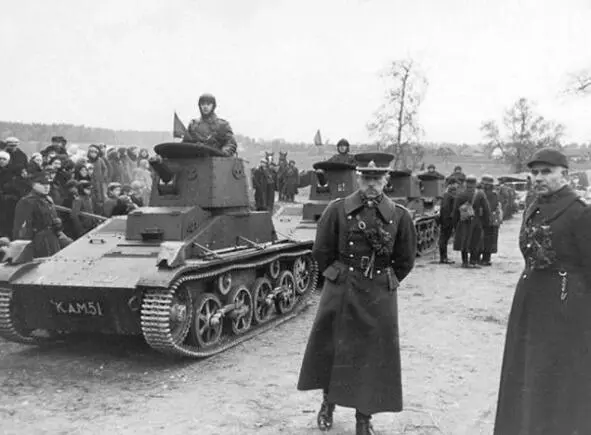
Lithuanian tanks, probably of their own production, on the border with the Polish Republic. The servicemen are awaiting an order to begin the occupation. The prize for this campaign, with the permission of the Germans, is the Vilnius region, the price paid for humiliations and ultimatums from Poland
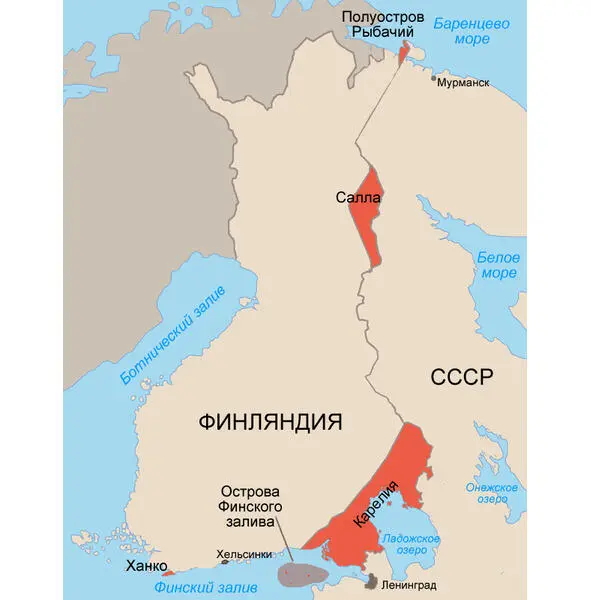
Ideas of Great Finland uniting the peoples of the Finnish-Ugric group; Finns, Karelians, Estonians, from the Gulf of Bothnia to the Ural Mountains, spread with the separation of Finland from Russia in 1918. The Government of Suomi sends a petition to the warring Germany. The bottom line: the conclusion of the Peace of Brest with the condition of East Karelia’s accession to Finland. During their own civil war, April 29, 1918, the White Finns capture Vyborg. The Nazis arrange the genocide of all people who do not speak Finnish (retired military, high school students in Russian uniform, and even Poles). Three thousand people die. Two weeks later, on May 15, the government of Finland declares war to Soviet Russia. Its troops occupy, in particular, the Russian, from the sixteenth century, Pechenga. Later in «Petsamo» large reserves of nickel ore will be explored. From 1935, their industrial development by the Anglo-American corporations will begin. The Finnish military partially blocking Petrograd, contributing to the first great famine in this city. According to averaged data, 300 thousand people become victims of it, as well as the «red» terror. In the Mannerheim rate, a plan of «national uprisings» is being developed, Finnish instructors are singled out for creating hotbeds of insurrection. However, the plans of the field marshal to annex East Karelia, the Kola Peninsula and the attack on Petrograd, Germany does not support. After the Vyborg tragedy, joint operations to overthrow the Bolshevik government together with the Finns refused to conduct the White Army. By May 1920, the Red Army units were eliminating the puppet North Karelian state. In October of the same year, Finland and the USSR signed the Tartu Peace Treaty. According to this pact, in exchange for peace, Russia loses a part of its territories. In 1921, Helsinki unleashed the second Soviet-Finnish war. The divisions of the «forest partisans» commit sabotage and murder of supporters of Soviet power. The fighting ends in March 1922. A document is signed on ensuring the inviolability of the Soviet-Finnish border. About 30,000 people dissatisfied with the new order go to Finland. Right up to the end of the 20s, armed groups make raids on Soviet territory. Anyway, the mood in Finland does not seem friendly to the USSR government. The proposal of the Council of People’s Commissars of Commerce – assignment of the border from Leningrad at the expense of Finland, in exchange for twice the area of Eastern Karelia that exceeds the area. Rent Hanko Island to create a Soviet military base. Disarmament and demolition of the Mannerheim Line on the Karelian Isthmus. Finland rejects these conditions. On the map – the situation before and after the Soviet-Finnish (Winter) War
Читать дальшеИнтервал:
Закладка:
Похожие книги на «Win the war. All in order»
Представляем Вашему вниманию похожие книги на «Win the war. All in order» списком для выбора. Мы отобрали схожую по названию и смыслу литературу в надежде предоставить читателям больше вариантов отыскать новые, интересные, ещё непрочитанные произведения.
Обсуждение, отзывы о книге «Win the war. All in order» и просто собственные мнения читателей. Оставьте ваши комментарии, напишите, что Вы думаете о произведении, его смысле или главных героях. Укажите что конкретно понравилось, а что нет, и почему Вы так считаете.
